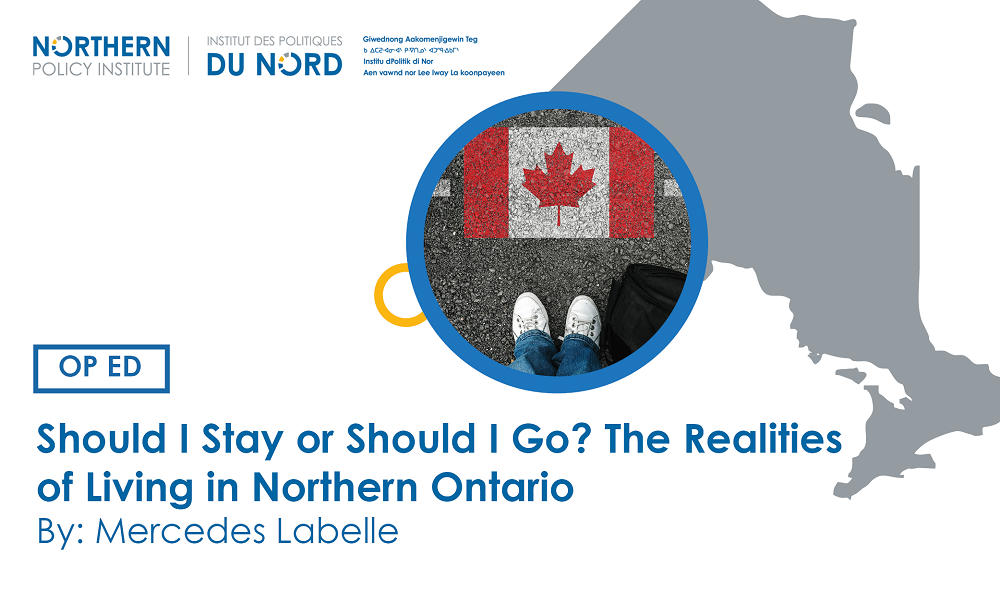Should I Stay or Should I Go? The Realities of Living in Northern Ontario
December 14, 2022 - If you live in a Northern Ontario community – or any community for that matter – you either a) were born there and stayed, or b) left one community and settled in another. Multiple factors can influence your decision to stay in a community: the presence of family and friends, educational and/or job opportunities, and a sense of welcoming and belonging. But the same factors that can influence a person to stay in a community, can push someone else away from a community where there is absence of family and friends, educational and/or employment opportunities, and a sense of welcoming or belonging.

In a recent series of reports titled What Makes a Welcoming Community?, Northern Policy Institute wanted to know why people moved to, or remained in, Northern Ontario communities. For those that once lived here, but have since left, we also wanted to know why they left. So, we asked – and over 800 people answered our Individual Experience and Exit surveys.
Factors such as employment and housing satisfaction, opportunities present in communities, service accessibility and usage, and other social factors were included in the surveys. Overall, a common notion among the respondents is that both social and economic factors play a large role in the decision-making process when staying in or leaving a community.
Collecting this information can help inform municipalities and local organizations as to the actions they can take to make people want to stay in their current community, which in turn, improves the community for all residents.
For example, survey respondents that have left Northern Ontario noted the biggest difficulty they faced was the lack of social interaction with other residents. With this information, municipalities and local organizations can work to promote socialization through virtual or in-person workshops, events, and activities to better connect those living in our communities. Increasing the frequency and quality of social interactions within communities can help foster a greater sense of welcoming and belonging, which encourages an individual to stay in their community.
On the other hand, if you’re an employer, you – like many other employers – might be facing difficulties finding and retaining employees. Survey results showed that respondents largely indicated being satisfied with their employment situations, especially those in higher-skilled occupations. That being said, the most common reason noted for leaving a community was employment related. Specifically, respondents indicated being most likely to leave a community if there were better job opportunities elsewhere; some respondents indicated there was lack of diversity in their local labour market, and that they felt their salaries were low. This means there is room for improvement in the local labour market to aid in employee retention.
In fact, it is possible to positively influence job satisfaction well before an employee enters the labour force. For example, employers and potential employees can benefit from alignment between programs taught at post-secondary institutions, and occupations currently (or in the coming years, projected to be) in need. Employers can also directly engage with potetnial future employees by going where they are, on campus, or inviting them to come visit workplaces and see what jobs actually entail.
In the workplace, employers can look to implement HR policies to help a new employee integrate into the workforce, such as cultural competency training (when applicable), workplace mentoring, and providing training to fill gaps in experience and/or training. Cumulatively, the recommendations from this research aim to help reduce the number of out-migrants from Northern Ontario communities.
Why is this important? Because we have a labour shortage, right now, and it is only going to get worse. Low birthrates, an overall aging population, and mismatches between skills local labour has and those local employers need mean this problem isn’t going away anytime soon. Worse, this is a global phenomenon and that means the competition for people is going to get more intense, not less.
We should continue making efforts that will make people want to stay – and even better, encourage their family and friends to move, or stay, here too. You can help. To track the progress our regions are making in attracting, welcoming, and retaining people, NPI and its partners will be repeating these surveys every February for the next few years. When you see a survey come across your inbox or your social media feed, take it. And, share it with others. Help us help your region figure out what is working, and what needs to change, to make our hometowns the most welcoming in Canada.
Mercedes Labelle is a Senior Policy Analyst at NPI.
Write for us
The content of Northern Policy Institute’s blog is for general information and use. The views expressed in this blog are those of the author and do not necessarily reflect the opinions of Northern Policy Institute, its Board of Directors or its supporters. The authors take full responsibility for the accuracy and completeness of their respective blog posts. Northern Policy Institute will not be liable for any errors or omissions in this information, nor will Northern Policy Institute be liable for any detriment caused from the display or use of this information. Any links to other websites do not imply endorsement, nor is Northern Policy Institute responsible for the content of the linked websites.
Northern Policy Institute welcomes your feedback and comments. Please keep comments to under 500 words. Any submission that uses profane, derogatory, hateful, or threatening language will not be posted. Please keep your comments on topic and relevant to the subject matter presented in the blog. If you are presenting a rebuttal or counter-argument, please provide your evidence and sources. Northern Policy Institute reserves the right to deny any comments or feedback submitted to www.northernpolicy.ca that do not adhere to these guidelines.
